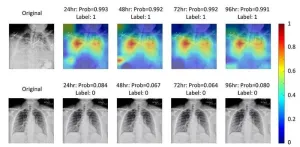(Press-News.org) Plants are not exposed to herbivores without defenses. When an insect feeds on a leaf, thereby wounding it and releasing oral secretions, a signaling cascade is elicited in the plant, usually starting with a rapid increase in the amount of the plant hormone jasmonic acid and its active isoleucine conjugate. Jasmonic acid regulates various reactions in plants, including defenses against herbivores and responses to environmental stress.
Mutants with disadvantageous properties do not necessarily disappear
An important thesis of evolutionary theory is natural selection and the conclusion that mutants with disadvantageous properties disappear again. However, researchers at the Max Planck Institute for Chemical Ecology in Jena have made observations on the wild tobacco species Nicotiana attenuata, also known as coyote tobacco, that contradict this prediction.
Twenty years ago, the scientists conducted field trials with tobacco plants muted in their defense signals in their natural environment, the Great Basin desert in the U.S. state of Utah. These genetically modified plants attracted leaf hoppers of the genus Empoasca, which were not found on wild type plants whose defenses had not been impaired. At the same time, the researchers observed that feeding damage by leaf hoppers could also be observed on some individuals in natural populations. They showed that natural defense mechanisms in these individual plants were compromised. However, the research team also found that other defense-impaired mutants exposed to only few herbivores in the field grew significantly faster than those with intact defense signals did. However, in years of high herbivore pressure, the mutants were so severely attacked that they did not survive and were unable to reproduce. "These findings led us to think that natural populations of Nicotiana attenuata might contain natural mutants in the defense signaling pathway and that these mutants were maintained in natural populations by trade-offs between growth- and defense-related selection pressures," said study leader Ian Baldwin, explaining the previous observations underlying the study.
To test this hypothesis, Ian Baldwin's team developed what is called a MAGIC population, which captures a large portion of the genetic diversity of the entire Nicotiana attenuata species in a breeding population with a homogenized genetic background. Creating this population required screening hundreds of natural plant accessions from seed collections at different locations in the Great Basin Desert over three decades to eventually select 26 very different parental lines that were crossed with each other in a very structured way for a decade. The result of these crosses is the MAGIC (multi-parent advanced generation inter-cross) population. In addition, the researchers created a high-quality coherent reference genome.
Priority of growth and reproduction over defense becomes an advantage in years with little herbivore pressure
With this data set, the scientists were able to accurately map the genetic basis of the higher susceptibility to herbivores and the variation in the levels of the jasmonic acid conjugate and locate the causative mutation in the genome. “In Nicotiana attenuata plants, variation in the JAR gene affects how much of the jasmonic acid conjugate is accumulated. A mutation in this gene results in lower levels than in normal plants. The mutants prioritize growth and reproduction over defense, making them more susceptible to insect attack but potentially better at growing fast and producing more offspring," says the study's first author Rishav Ray. In addition, the researchers demonstrated that the mutation in this single gene responsible for plant defense signaling is maintained in a population for at least 10 years, and a robust genetic network can buffer the deficit in defense, allowing the mutants to survive in nature.
Genetic mutations occur constantly and are, by and large, randomly distributed throughout genomes. Most often, these mutations are detrimental, but occasionally they are responsible for helpful traits in mutants that facilitate survival in certain environments. In this case, as suggested in the present study, the main mutation may be part of a robust genetic network and lead to the accumulation of other mutations with large effects. This increases genetic diversity in natural populations, which is important for their long-term survival and success in the rapidly changing environments of our planet. "With the planet’s rapidly changing climate, it is essential to understand and identify how natural processes have maintained genetic diversity so that we can find better ways of protecting and preserving the remaining biodiversity on our planet," Ian Baldwin emphasizes the importance of the findings. The extensive population sampling carried out 30 years ago in the Great Basin desert by the scientist, who has been investigating the survival strategies of this wild tobacco species for decades, was crucial to the success of the study. The study shows that even after many years the collection and storage of such samples can still prove valuable, and emphasizes the importance of funding such long-term research projects.
END
It all depends on the genetic diversity
Natural tobacco mutants impaired in their defenses produce more offspring in years of low herbivore pressure and thus persist in plant populations
2023-08-21
ELSE PRESS RELEASES FROM THIS DATE:
UArizona Valley fever expert Galgiani to receive lifetime achievement award
2023-08-21
The Arizona Bioindustry Association announced that renowned Valley fever researcher John Galgiani, MD, professor and director of the Valley Fever Center for Excellence at the University of Arizona College of Medicine – Tucson, is the 2023 recipient of the AZBio Pioneer Award for Lifetime Achievement.
The Pioneer Award is the highest honor awarded by Arizona’s bioscience community and is extended to an Arizonan whose body of work has made life better for people at home and around the world. Galgiani’s four decades of Valley fever research, ...
University breaks ground on one-of-a-kind semiconductor facility
2023-08-21
The University of Arkansas celebrated an important milestone with the groundbreaking on a building that Chancellor Charles Robinson suggested might someday rival the U of A’s most iconic structure, Old Main, in significance to the university and the state of Arkansas.
Robinson and other university leaders, including University of Arkansas System President Don Bobbitt and members of the U of A System Board of Trustees, as well as researchers and industry leaders, gathered at the Arkansas Research and Technology Park in South Fayetteville to celebrate construction of the national Multi-User Silicon Carbide ...
Do prisons hold the key to solving the opioid crisis?
2023-08-21
With opioid overdose deaths surging in the United States, many communities are in desperate need of solutions to bring down the body count. Among the most promising is strengthening prison reentry programs for highest-risk users, a Rutgers-led study has found.
“For people who use drugs and have been in prison for several years, the reentry period can be chaotic and disorienting,” said Grant Victor, an assistant professor in the Rutgers School of Social Work and lead author of the study published in the Journal of Offender Rehabilitation.
“Closing ...
AI to predict critical care for patients with COVID-19
2023-08-21
The COVID-19 pandemic dealt a huge blow to healthcare systems and highlighted their major shortcomings. As of June 2023, there have been over 760 million confirmed cases of COVID-19, with almost 7 million deaths worldwide. During the major COVID-19 outbreaks, hospitals often had their intensive care units (ICU) running at full capacity for providing invasive mechanical ventilation to patients who were diagnosed as positive for COVID-19. These ICUs often operated with insufficient staff and intubation equipment.
One way to mitigate such problems is to accurately predict the prognosis ...
Simple blood test may predict future heart, kidney risk for people with Type 2 diabetes
2023-08-21
Research Highlights:
An analysis of a clinical trial of more than 2,500 people with Type 2 diabetes and kidney disease found that high levels of four biomarkers are strongly predictive for the development of heart and kidney issues.
People who took canagliflozin, a sodium glucose co-transporter 2 inhibitor (SGLT2 inhibitor), had lower levels of the four biomarkers compared to those who took a placebo over the three-year study period.
Treatment with canagliflozin helped to substantially reduce the risk of hospitalization for heart failure and other heart complications among patients considered to have the highest risk.
Embargoed until 1 p.m. CT/2 p.m. ET Monday, ...
Listening for “sounds” from the far corners of space
2023-08-21
Scientists spectacularly confirmed the existence of gravitational waves several years ago, but now they are searching the cosmos for new and different types of these waves that result from different objects in deep space.
Benjamin Owen, a professor in the Department of Physics and Astronomy at Texas Tech University, was recently awarded a three-year National Science Foundation (NSF) grant that aims to uncover and confirm additional types of gravitational waves.
“So far with gravitational waves we’ve seen what happens when you have ...
Agrela Ecosystems ignites innovation in data-driven agriculture
2023-08-21
ST. LOUIS, MO, August 21, 2023 – Agrela Ecosystems, a startup launched by Nadia Shakoor, PhD, principal investigator, at the Donald Danforth Plant Science Center announced the pilot launch of its flagship product, PheNodeTM. This milestone marks the first step towards a full-scale commercial release set for 2025. PheNode is an advanced, scalable environmental sensor platform designed to empower users with customizable data collection and the rapid integration of new technologies. Already creating a buzz, the platform is now collecting data and generating customer feedback, ...
PS gene-editing shown to restore neural connections lost in brain disorder
2023-08-21
MINNEAPOLIS/ST. PAUL (08/21/2023) — A new study from the University of Minnesota is the first to demonstrate the ability for gene therapy to repair neural connections for those with the rare genetic brain disorder known as Hurler syndrome. The findings suggest the use of gene therapies — an entirely new standard for treatment — for those with brain disorders like Hurler syndrome, which have a devastating impact on those affected.
The study was published in the Nature journal Scientific Reports.
Hurler syndrome, also known as mucopolysaccharidosis type I (MPS I), is a genetic disorder affecting newborns ...
Argonne receives funding to use AI and machine learning for nuclear physics research
2023-08-21
The U.S. Department of Energy (DOE) announced $16 million for 15 projects that will implement artificial intelligence (AI) methods to accelerate scientific discovery in nuclear physics research. DOE’s Argonne National Laboratory will lead two of those projects and be a collaborator on another.
These projects will use AI and Machine Learning (ML) tools and methods for nuclear physics experiments, simulation, theory and accelerator operation to expand and accelerate scientific reach.
“Artificial intelligence has the potential to shorten the timeline ...
Bloom studying impact of exposure to perfluoroalkyl substances on weight loss
2023-08-21
Michael Bloom, Associate Professor, Global and Community Health, received $158,900 from the National Institutes of Health for the project: "Impact of Exposure to Perfluoroalkyl Substances on Weight Loss: A Pilot Study of Hispanic Children with Overweight/Obesity Participating in a Community-based Weight Loss Intervention Program."
In this pilot study, Bloom is evaluating associations between exposures to perfluoroalkyl substances (PFAS) and weight lost during a 10-week weight loss intervention among Hispanic children with overweight and obesity. He and his collaborators will quantify the association between 12 different PFAS ...
LAST 30 PRESS RELEASES:
Chimps’ love for crystals could help us understand our own ancestors’ fascination with these stones
Vaginal estrogen therapy not linked to cancer recurrence in survivors of endometrial cancer
How estrogen helps protect women from high blood pressure
Breaking the efficiency barrier: Researchers propose multi-stage solar system to harness the full spectrum
A new name, a new beginning: Building a green energy future together
From algorithms to atoms: How artificial intelligence is accelerating the discovery of next-generation energy materials
Loneliness linked to fear of embarrassment: teen research
New MOH–NUS Fellowship launched to strengthen everyday ethics in Singapore’s healthcare sector
Sungkyunkwan University researchers develop next-generation transparent electrode without rare metal indium
What's going on inside quantum computers?: New method simplifies process tomography
This ancient plant-eater had a twisted jaw and sideways-facing teeth
Jackdaw chicks listen to adults to learn about predators
Toxic algal bloom has taken a heavy toll on mental health
Beyond silicon: SKKU team presents Indium Selenide roadmap for ultra-low-power AI and quantum computing
Sugar comforts newborn babies during painful procedures
Pollen exposure linked to poorer exam results taken at the end of secondary school
7 hours 18 mins may be optimal sleep length for avoiding type 2 diabetes precursor
Around 6 deaths a year linked to clubbing in the UK
Children’s development set back years by Covid lockdowns, study reveals
Four decades of data give unique insight into the Sun’s inner life
Urban trees can absorb more CO₂ than cars emit during summer
Fund for Science and Technology awards $15 million to Scripps Oceanography
New NIH grant advances Lupus protein research
New farm-scale biochar system could cut agricultural emissions by 75 percent while removing carbon from the atmosphere
From herbal waste to high performance clean water material: Turning traditional medicine residues into powerful biochar
New sulfur-iron biochar shows powerful ability to lock up arsenic and cadmium in contaminated soils
AI-driven chart review accurately identifies potential rare disease trial participants in new study
Paleontologist Stephen Chester and colleagues reveal new clues about early primate evolution
UF research finds a gentler way to treat aggressive gum disease
Strong alcohol policy could reduce cancer in Canada
[Press-News.org] It all depends on the genetic diversityNatural tobacco mutants impaired in their defenses produce more offspring in years of low herbivore pressure and thus persist in plant populations



